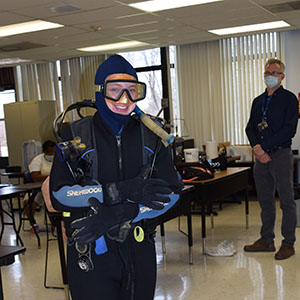Science Teacher Shares Passion and Lesson on SCUBA Diving
 Lakeside High science teacher Peter Janski tries to keep his lessons interesting to capture the attention of the students.
Lakeside High science teacher Peter Janski tries to keep his lessons interesting to capture the attention of the students.
He decided to use his love of SCUBA diving when he was teaching the Security and Law Enforcement classes this year. Janski learned SCUBA when he had to take a mandatory two credit hours of physical education when he was an undergrad at Canisius College. He ended up enjoying it because it was physically demanding and helped him to overcome his fear of the water. “There is a lot of science involved for SCUBA,” explains Janski . “You need to know how to use Navy dive charts to see how long a person could stay underwater at different depths, Boyle’s Gas Laws, physiological diseases such as embolisms, bends and nitrogen narcosis or rapture of the deep. Also the physics of how light and sound travels underwater had to be thoroughly comprehended. Sound travels much faster underwater and objects appear closer underwater due to refraction. ”
In the lesson with the Security and Law Enforcement students, they discussed how they may have to conduct a water rescue in their careers. “During my lesson the students have a good laugh watching one of their classmates, Paige Dennis, don a wet suit and try to walk around with an air tank on her back and a weight belt around her waist.” Paige said she it was fun getting the suit on, but hot.
Knowing that many of the Security and Law Enforcement students will never even try SCUBA, he tries to include practical law enforcement skills like rescuing a drowning victim. He shared the slogan “REACH-THROW-ROW-GO” that was instilled in him as a Boy Scout and what he teaches as a guide to Boy Scouts on high adventure canoe trips in Algonquin Provincial Park in northern Ontario. “I discussed with the students the incredible strength of moving water, how to perform ice rescues and how extreme cold water can cause death by Sudden Cold Water Immersion.”
Mr. Janski said he was pleased on how his lessons went. “I think discussing the science in this manner will stick with them longer and help them apply that knowledge in their lives. You never know it could help one of them to save someone else’s life so that is a great lesson to learn.”

